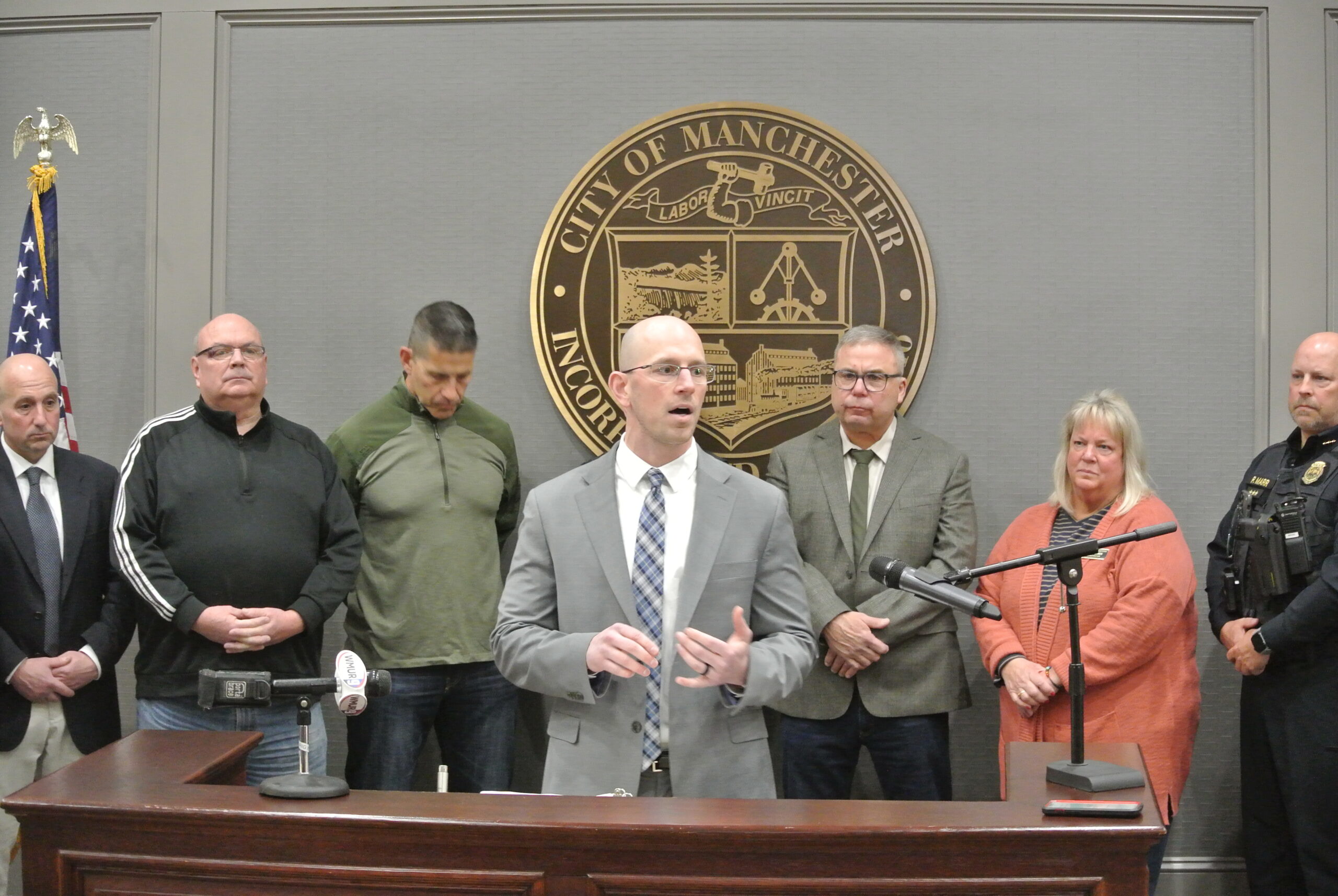“We’re being inundated with repeat offenders,” Manchester Mayor Jay Ruais said Wednesday, and it’s past time for the state legislature to do something about it.
That was the mayor’s message during a gathering of city leaders in the Aldermanic Chambers to call on lawmakers in Concord to fix the bail system that’s made Manchester ground zero for a revolving door system for criminals.
 Of the 817 people Manchester Police arrested this year alone, 306 — or 37 percent — were already out on bail for a previous criminal charge. In the last 12 months, repeat offenders made up 26 percent of the total arrests, with 1,178 people already on bail of the total 4,529.
Of the 817 people Manchester Police arrested this year alone, 306 — or 37 percent — were already out on bail for a previous criminal charge. In the last 12 months, repeat offenders made up 26 percent of the total arrests, with 1,178 people already on bail of the total 4,529.
Ruais gathered city leaders Wednesday in the Aldermanic Chambers to call on lawmakers in Concord to fix the bail system that’s made Manchester ground zero for a revolving door system for criminals.
“People need to feel safe on our streets. The safety of our citizens is non-negotiable. We cannot allow our community to experience this repeat criminal activity,” Ruais said.
As state lawmakers debate different proposals to fix the bail system, Ruais and city leaders advocated for two changes they say would have a meaningful impact: Eliminate personal recognizance bail for all felony charges, and require anyone who is arrested while on bail to go before a judge for a new bail hearing.
Assistant Police Chief Peter Marr said the problem of repeat offenders getting easy personal recognizance bail and then going on to commit more crimes is directly tied to the 2018 bail reform law. The broken system is pushing police officers to the brink, Marr said.
“It’s very tough, it is a morale decreaser,” Marr said. “It does have an effect.”
The most common charges for people on bail are drug possession, being a felon in possession of a dangerous weapon, simple assault, and criminal threatening, Ruais said.
“The questions that I would ask is this: Which of these crimes are acceptable to [allow to] occur repeatedly in our community? And what is it going to take to fix this?” Ruais said.
In the summer of 2022, Raymond Moore, now 42, allegedly stabbed and killed 75-year-old Manchester resident Daniel Whitmore. Whitmore had been walking and feeding ducks when he was allegedly killed by Moore, a man who at the time was on bail for two different cases, one involving an assault charge and one involving resisting arrest. Moore is currently being held after he was found incompetent to stand trial.
Ruais got elected with a promise to tackle crime, addiction, and homelessness that’s impacting Manchester’s quality of life. During a meeting this week with the board members of the 1269 Cafe, a Christian outreach ministry for the city’s homeless located on Union Street, Ruais said the board members expressed concern with safety in the surrounding neighborhood.
Even with statistics showing a drop in criminal activity in Manchester, that is not what is happening around the 1269 Cafe, Ruais said.
“The problem is they don’t see it’s getting better,” Ruais said.
Staff at 1269 were unable to comment to NHJournal Wednesday. Inside 1269’s facility, people were being served meals downstairs while staff upstairs assisted others with rehabilitation intake services. Outside the building a group of homeless people gathered, and there were many small sidewalk encampments throughout the neighborhood.
Manchester’s problem with repeat offender crime is a problem that affects the whole state, Ruais said. Repeat offenders drive the perception the city is not safe for businesses, residents, and visitors in New Hampshire’s largest city. Manchester can be an economic force for good in the Granite State, he said, but it is being held back by the 25 to 30 percent of repeat offender criminals.
“A thriving Manchester is good for the entire state of New Hampshire,” Ruais said.



